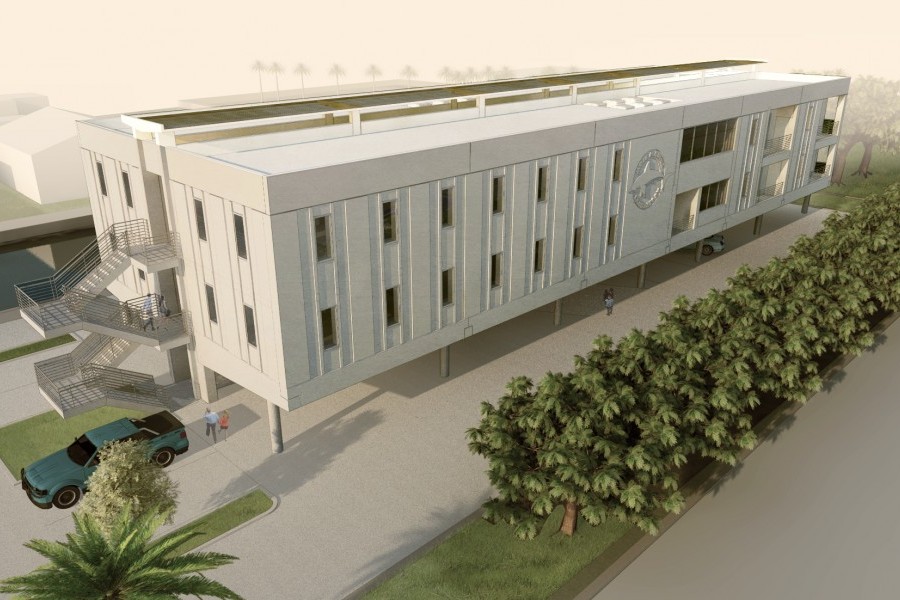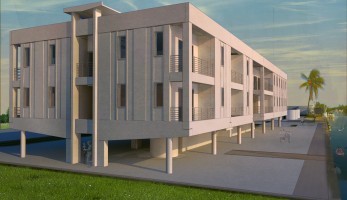Feb. 18 media opportunity in the Florida Keys
What: Mote Marine Laboratory will begin demolishing its buildings in the Florida Keys to make way for the construction of its new research and education facility. It is Mote’s goal to establish the first LEED Gold-certified facility in Monroe County, according to the contractor. On Feb. 18, Mote President and CEO Dr. Michael P. Crosby will briefly join the demolition team using a large front excavator to remove a portion of wall, kicking off the demolition of residential and office buildings that will ensue over the coming couple of weeks. The new facility, expected to open in early 2017, will more than double Mote’s research and education space in the Keys, allowing the Lab to expand programs focused on studying and restoring damaged coral reefs and on finding new ways to address global threats to reefs — particularly climate change and ocean acidification.
Attending media can gather photos and b-roll of this initial demolition action and the original laboratory facility that will remain until the new facility is complete.
When: 2:30 p.m. on Thursday, Feb. 18. (Please arrive 10 minutes early.)
Where: Mote’s research facility in the Florida Keys: 24244 Overseas Highway,
Summerland Key, Fla. 33042
Interviewees:
Dr. Michael P. Crosby, President & CEO of Mote
Dr. David Vaughan, Executive Director of Mote’s Florida Keys campus
Elizabeth Moore, Member Mote’s Leadership Circle who contributed $1 million for the new laboratory in the Florida Keys
Derek Templeton, Vice President of Facilities at Mote
John LaCivita, Vice President at Willis A. Smith Construction, Inc. (the Sarasota-Based company handling the demolition and construction)
RSVP required: Contact Hayley Rutger athrutger@mote.org or 941-374-0081
More details
Mote’s new facility on Summerland Key has been designed with the goal of achieving a LEED Gold certification. If this is accomplished it will be the first LEED Gold-certified facility in Monroe County, according to the construction contractor. At 19,000 square feet, it will more than double Mote’s workspace in the Keys and allow crucial research programs to expand. The LEED (Leadership in Energy & Environmental Design) certification recognizes green buildings that “save money and resources and have a positive impact on the health of occupants, while promoting renewable, clean energy,” says the LEED website. LEED Gold buildings have attained the second-highest of four levels, marking a significant commitment to green building that evinces Mote’s mission of sustainability.
The upcoming demolition and construction of this building will mark a major success of Oceans of Opportunity — Mote’s comprehensive fundraising campaign. The campaign is designed to support and expand Mote’s annual research and education operations; attract and nurture the next generation of marine scientists; spur long-term growth in the endowment to provide security and sustainability for Mote’s future; protect and restore fisheries in Sarasota Bay; and finance construction of the major new Keys facility.
Generous donors have pledged $45.5 million toward Mote’s campaign goal of $50 million. More support is needed urgently to help Oceans of Opportunity reach the finish line, in part to support the new Keys facility and the cutting-edge research planned there.
Mote research in the Keys focuses on coral reefs, “rainforests of the sea” that support thousands of marine species and contribute $6.3 billion to Florida’s economy. Reefs worldwide are threatened by climate change, ocean acidification, pollution, disease and more.
Mote’s Summerland Key facility — the southernmost marine lab in the continental U.S. and an international beacon of coral research — is uniquely positioned to study and restore depleted reefs, especially those in Florida’s blue backyard.
Mote scientists are leading efforts to understand why coral reefs are declining and how to bring them back in this lifetime. Mote raises thousands of fragments of staghorn coral, a threatened species, and plants them into the wild in cooperation with the Florida Keys National Marine Sanctuary. Mote scientists are studying these coral fragments to find strains most likely to survive changing ocean conditions.
Mote scientists have also developed a breakthrough technique for quickly growing and restoring brain, boulder and star corals — crucial reef-building species. Mote’s technique allows for restoring large areas of reef-building corals in just one or two years instead of the hundreds of years that some slow-growing corals might need on their own.
Mote’s coral restoration successes have drawn national and international attention. Check out a recent video story from The Atlantic highlighting restoration efforts led by Dr. David Vaughan.
Keys construction timing
In early January 2016, Mote researchers emptied the current two residential and office buildings on Summerland Key in preparation for their demolition beginning Feb. 18, leaving the current working lab building fully operational throughout construction. Once the new project is 99 percent complete, the old lab will be demolished.
Construction will ramp up during summer 2016, with the goal of opening the facility in early 2017.
The public can support Oceans of Opportunity,including the new Keys facility, by visitingwww.moteoceans.org or contacting Campaign Director Erin Knievel at 941-388-4441, ext. 415, oreknievel@mote.org.



